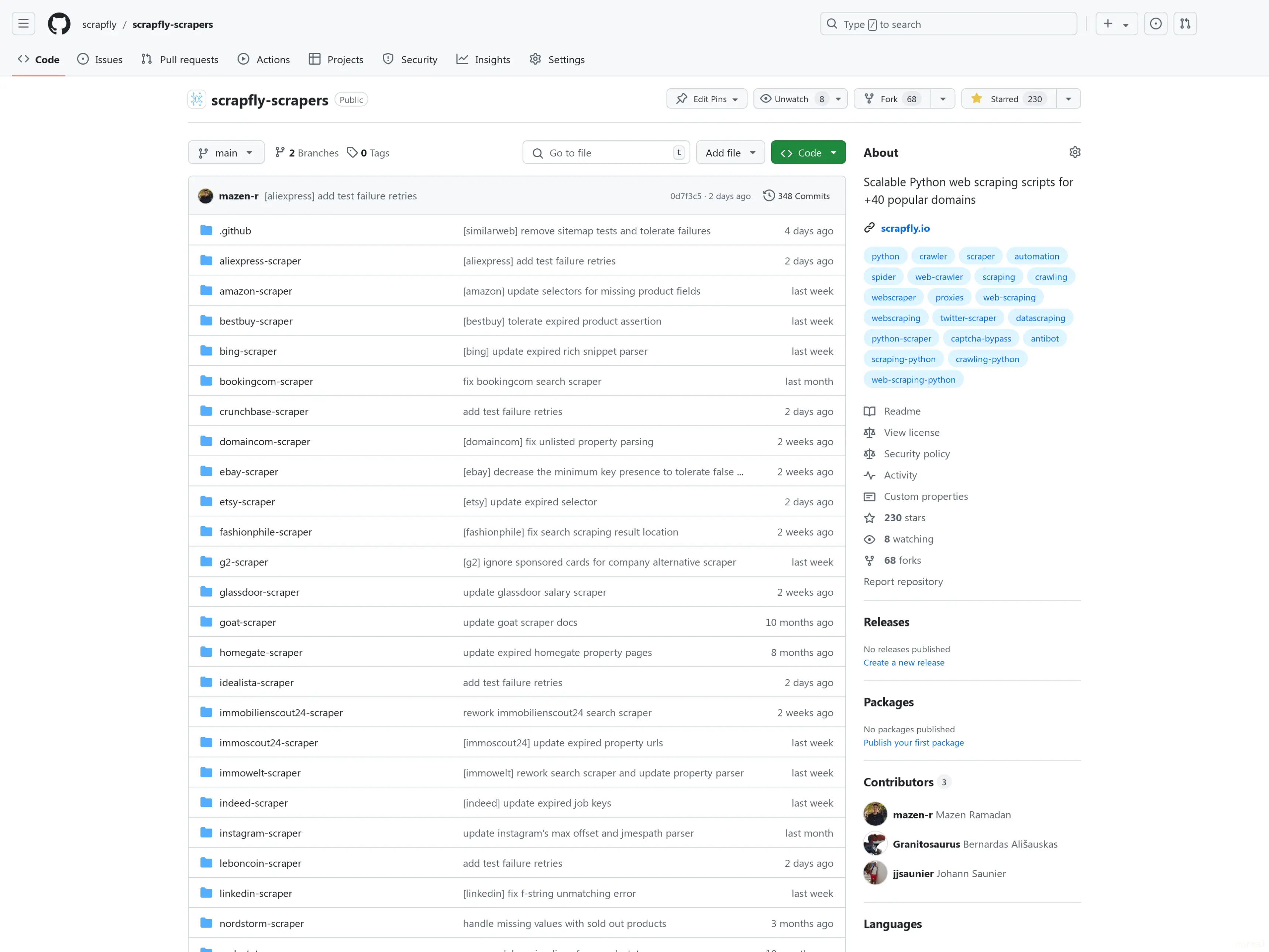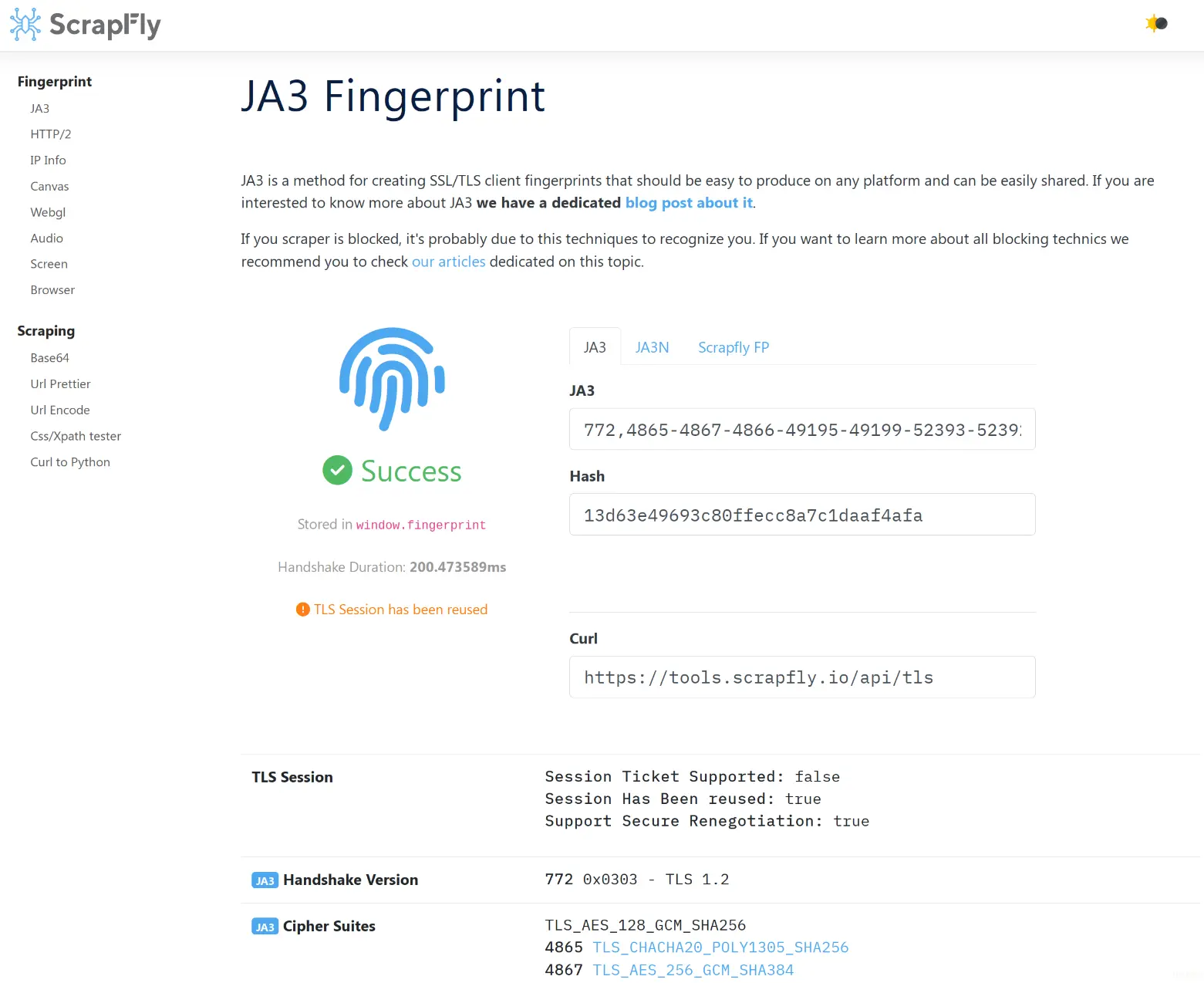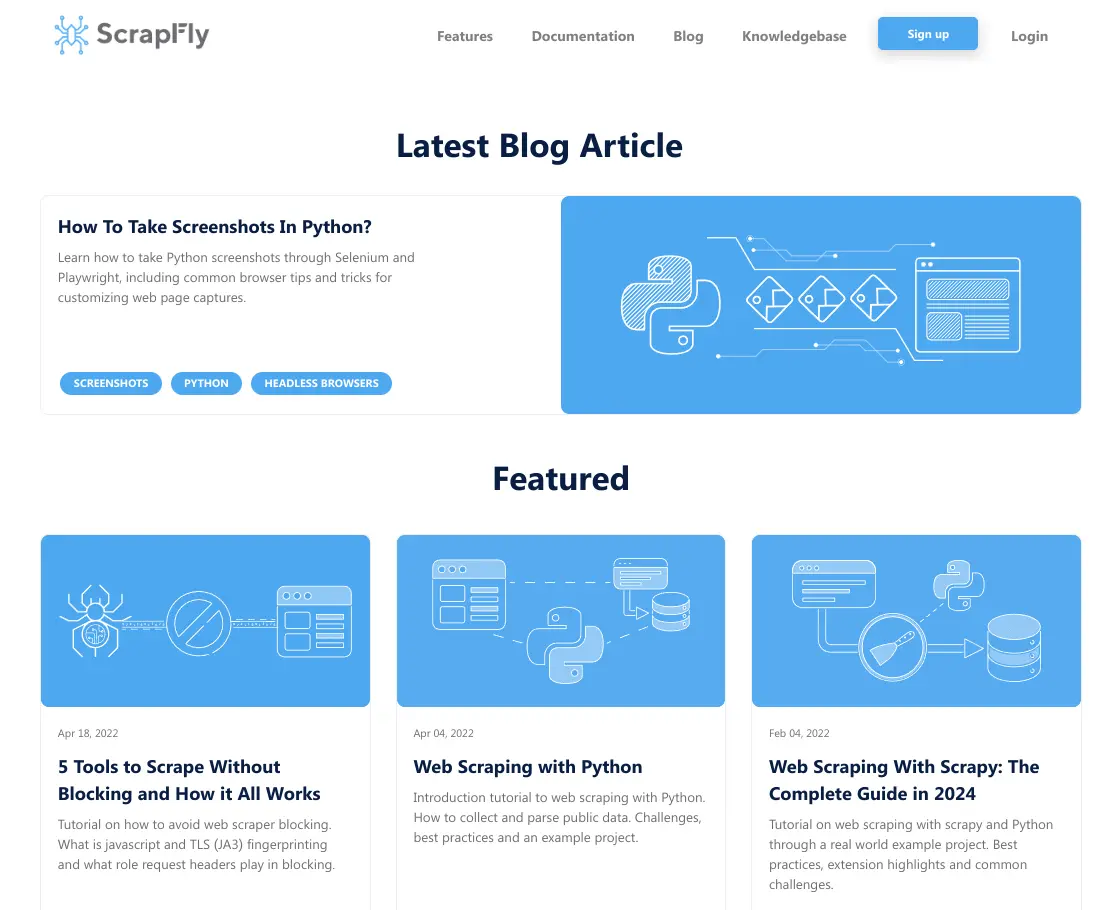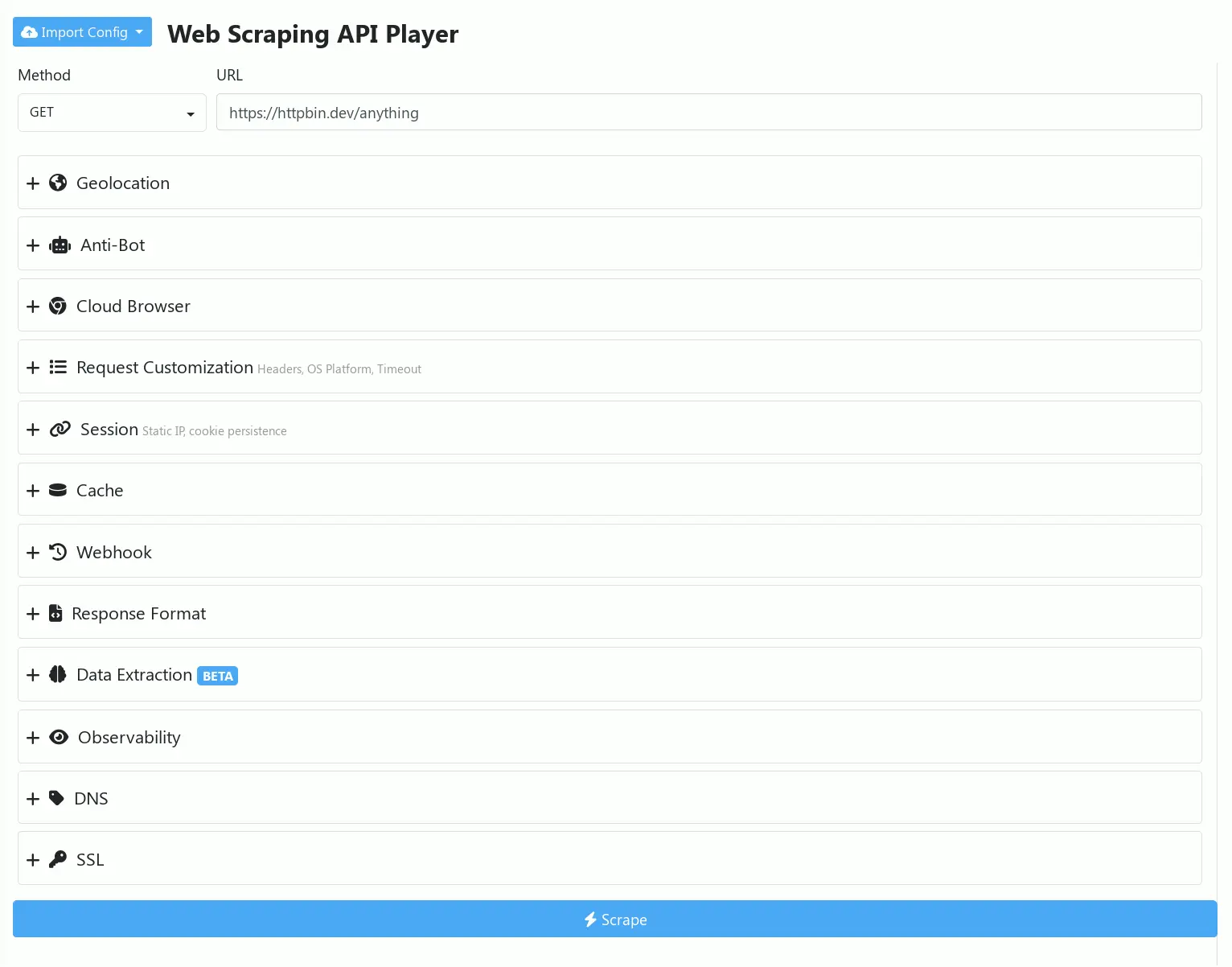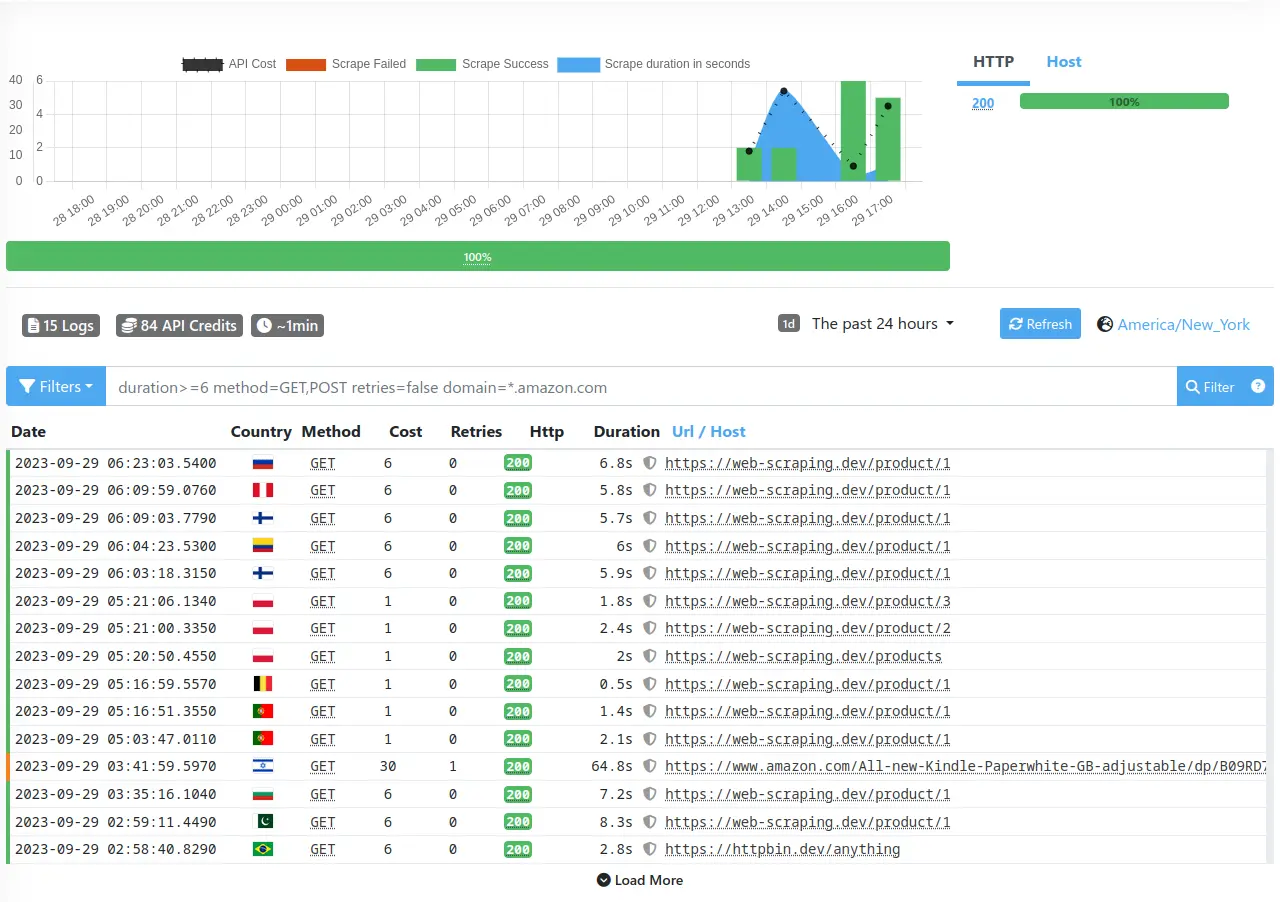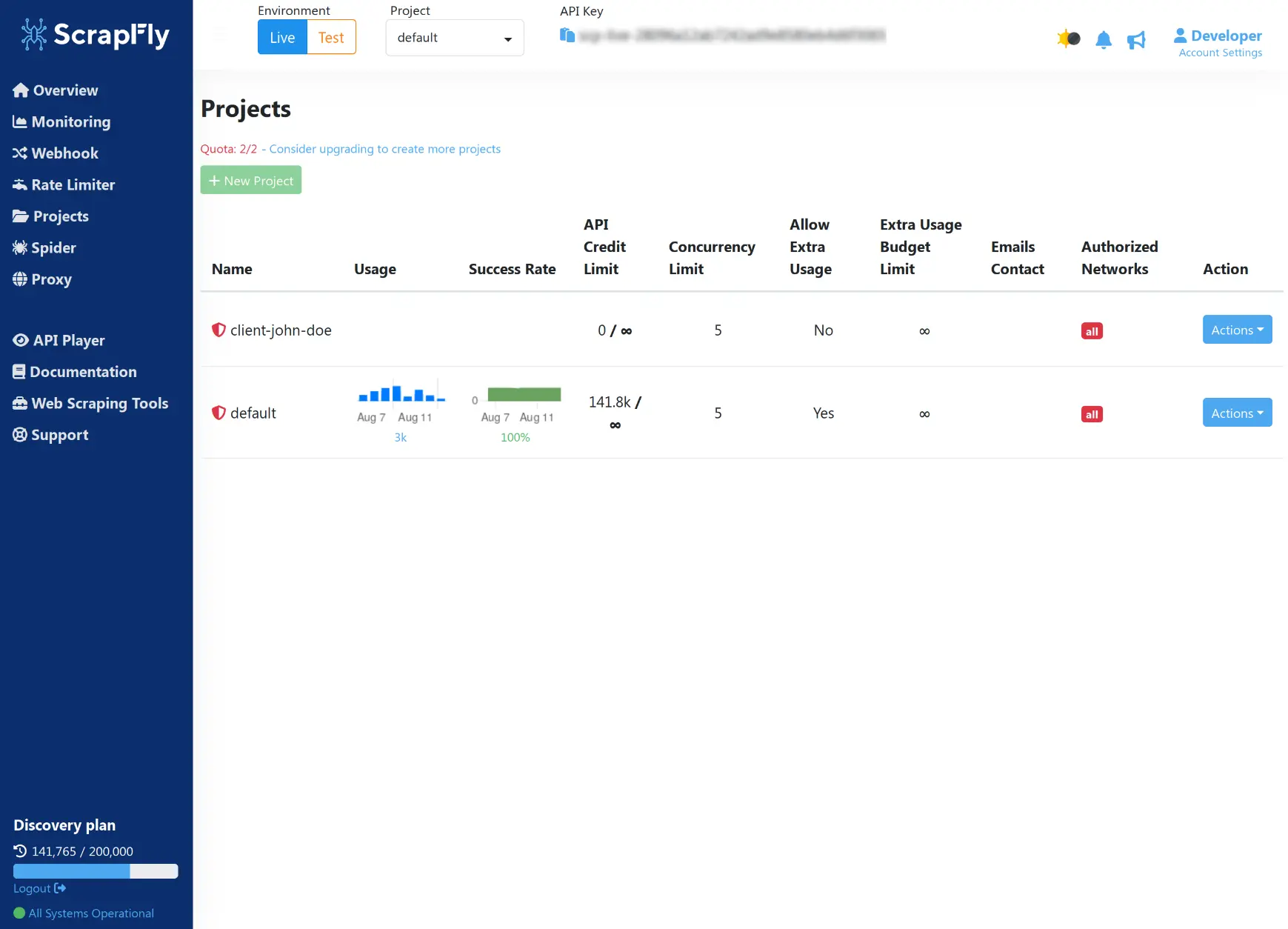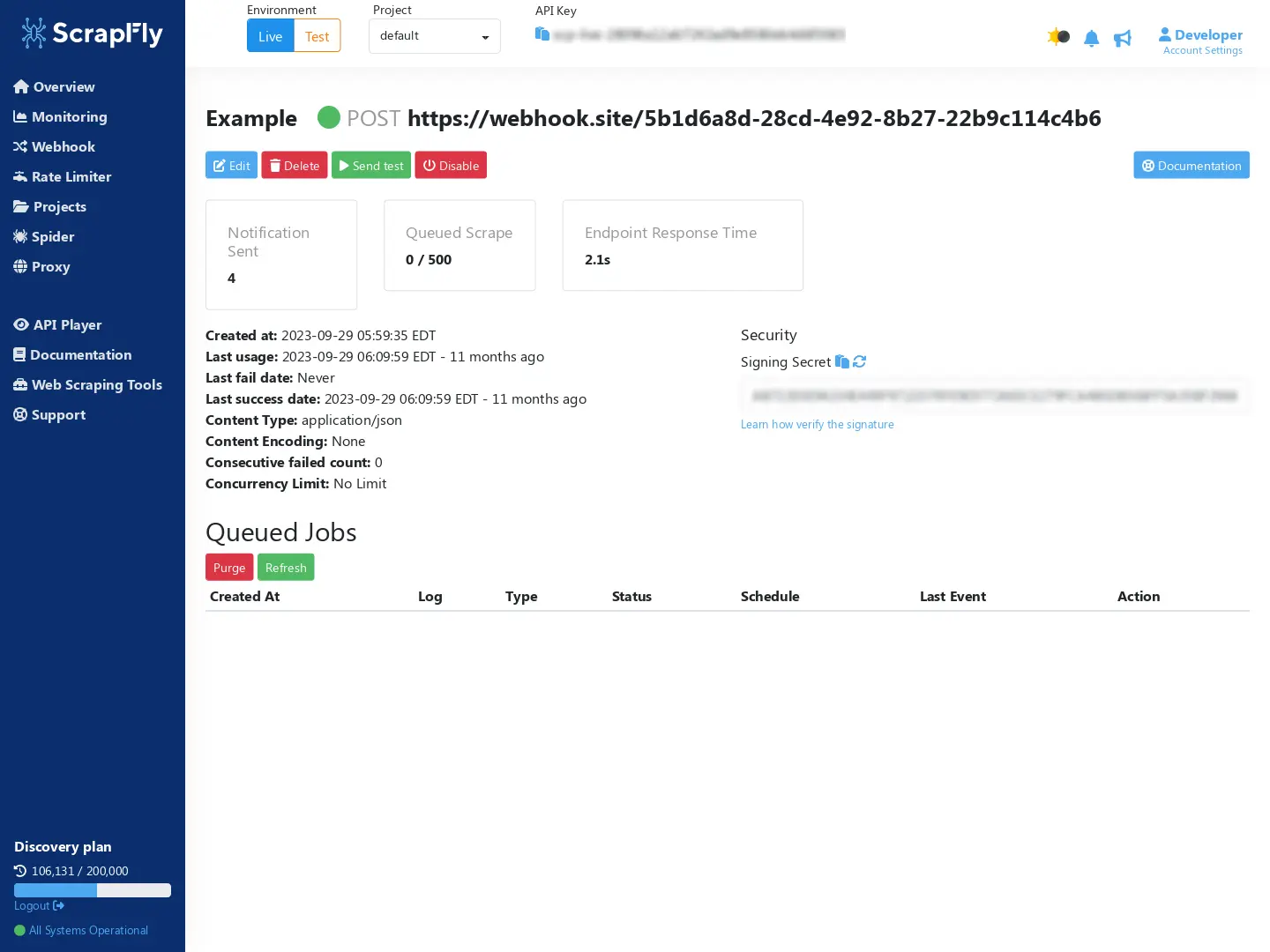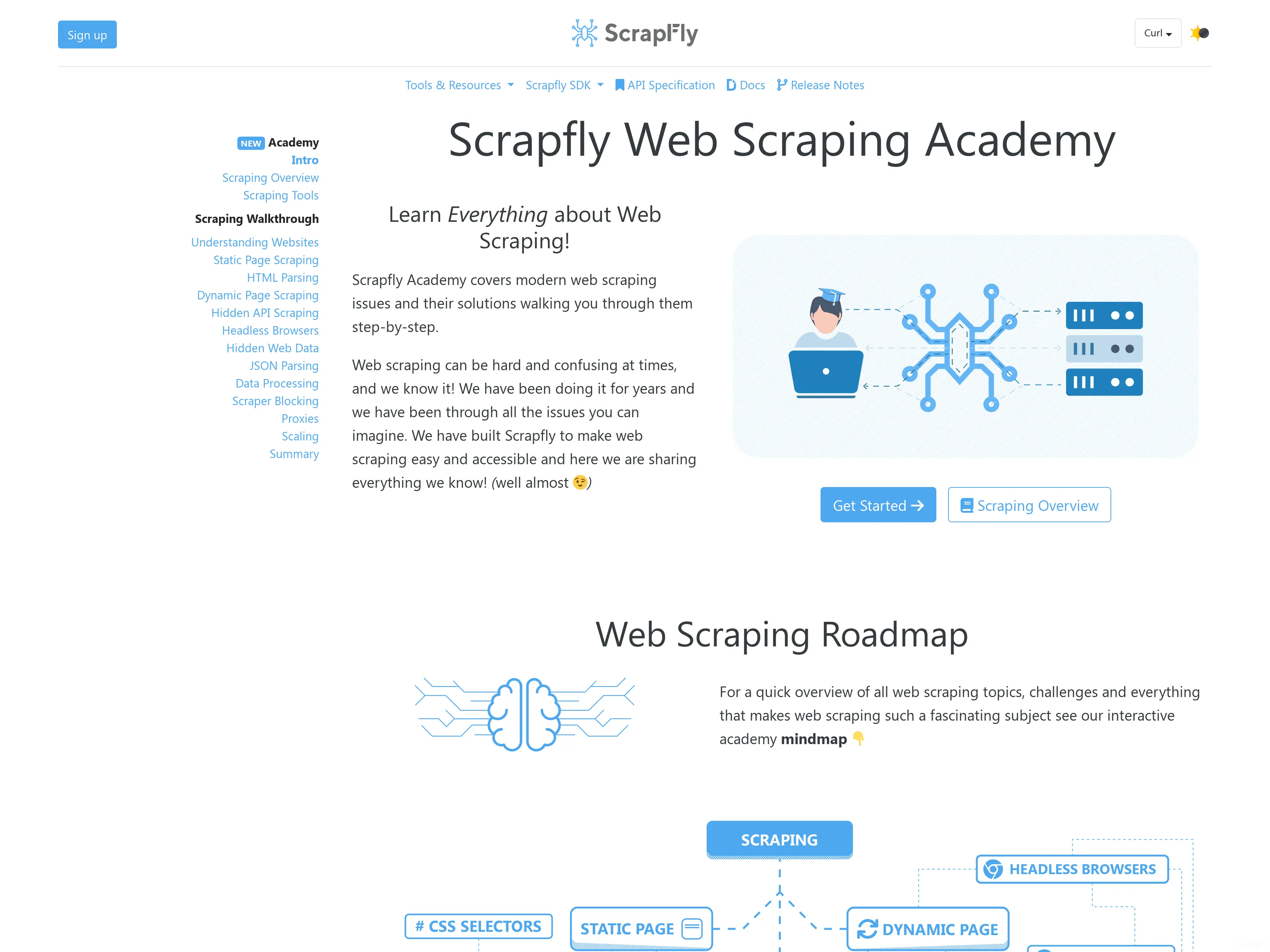
AI Web Scraping API
Unlock AI-Powered Web Automation
Tired of fragile web scrapers breaking on website updates or just the complexity of modern websites?
Let LLMs and machine learning models handle this for you:
- AI auto scrape to avoid fragile HTML parsing. Specify a URL, desired data type and get predictable results.
- Use LLM prompts to query scraped results using an LLM engine that understands HTML.
- Overcome scraping blocks with automatic and advanced block bypass.
- Utilize cloud-based browsers for scraping complex and dynamic pages as they appear in web browsers.
- Seamlessly integrate with popular AI toolkits like LangChain, LlamaIndex in Python and Typescript.


What Can it Do?
-
Automatically identify data objectsExtract products, reviews, articles and other common data objects without any additional input.
# pip install scrapfly-sdk[all] from scrapfly import ScrapeConfig, ScrapflyClient, ScrapeApiResponse client = ScrapflyClient(key="API KEY") api_response: ScrapeApiResponse = client.scrape( ScrapeConfig( url='https://web-scraping.dev/product/1', # what object to scrape? product, review, real estate listing etc. extraction_model="product", ) ) print(api_response.scrape_result['extracted_data']['data'])Output
import { ScrapflyClient, ScrapeConfig } from 'jsr:@scrapfly/scrapfly-sdk'; const client = new ScrapflyClient({ key: "API KEY" }); let api_result = await client.scrape( new ScrapeConfig({ url: 'https://web-scraping.dev/product/1', // what object to scrape? product, review, real estate listing etc. extraction_model: "product", }) ); console.log(api_result.result.extracted_data);Output
-
Predictable outputs with strong schemaGet structured outputs you can rely on using strong schema models ensuring each scrape call has a predictable result you can trust.
Name API name &extraction_model={model-name}Article articleEvent eventFood Recipe food_recipeHotel hotelHotel Listing hotel_listingJob Listing job_listingJob Posting job_postingOrganization organizationProduct productProduct Listing product_listingReal Estate Property real_estate_propertyReal Estate Property Listing real_estate_property_listingReview List review_listSearch Engine Results search_engine_resultsSocial Media Post social_media_postSoftware softwareStock stockVehicle Ad vehicle_adVehicle Ad Listing vehicle_ad_listing
-
Use any LLM prompt to query the scraped dataLLM engine optimized for scraping - ask any questions about the data using freeform prompting.
from scrapfly import ScrapeConfig, ScrapflyClient, ScrapeApiResponse client = ScrapflyClient(key="API KEY") api_response: ScrapeApiResponse = client.scrape( ScrapeConfig( url='https://web-scraping.dev/product/1', # Use any LLM prompt: extraction_prompt="What's price of the product?", ) ) print(api_response.scrape_result['extracted_data'])Output
import { ScrapflyClient, ScrapeConfig } from 'jsr:@scrapfly/scrapfly-sdk'; const client = new ScrapflyClient({ key: "API KEY" }); let api_result = await client.scrape( new ScrapeConfig({ url: 'https://web-scraping.dev/product/1', // Use any LLM prompt: extraction_prompt: "What's price of the product?", }) ); console.log(api_result.result.extracted_data);Output
-
Prompt for exact data structures and formatsPrompt for specific output types like Markdown, Json, CSV, or any other structure that fits you.
from scrapfly import ScrapeConfig, ScrapflyClient, ScrapeApiResponse client = ScrapflyClient(key="API KEY") api_response: ScrapeApiResponse = client.scrape( ScrapeConfig( url='https://web-scraping.dev/product/1', # Prompt for specific structured data formats: extraction_prompt="Extract product features in JSON format", ) ) print(api_response.scrape_result['extracted_data'])Output
import { ScrapflyClient, ScrapeConfig } from 'jsr:@scrapfly/scrapfly-sdk'; const client = new ScrapflyClient({ key: "API KEY" }); let api_result = await client.scrape( new ScrapeConfig({ url: 'https://web-scraping.dev/product/1', // Prompt for specific structured data formats: extraction_prompt: "Extract product features in JSON format", }) ); console.log(api_result.result.extracted_data);Output
-
Use Real Web BrowsersScrape javascript-powered websites and load all elements automatically using real web browsers with thousands of configurable fingerprints.
from scrapfly import ScrapeConfig, ScrapflyClient, ScrapeApiResponse client = ScrapflyClient(key="API KEY") api_response: ScrapeApiResponse = client.scrape( ScrapeConfig( url='https://web-scraping.dev/product/1', # add unique identifier to start a session session="mysession123", ) ) # resume session api_response2: ScrapeApiResponse = client.scrape( ScrapeConfig( url='https://web-scraping.dev/product/1', session="mysession123", # sessions can be shared between browser and http requests # render_js = True, # enable browser for this session ) ) print(api_response2.result))Output
import { ScrapflyClient, ScrapeConfig } from 'jsr:@scrapfly/scrapfly-sdk'; const client = new ScrapflyClient({ key: "API KEY" }); let api_result = await client.scrape( new ScrapeConfig({ url: 'https://web-scraping.dev/product/1', // add unique identifier to start a session session: "mysession123", }) ); // resume session let api_result2 = await client.scrape( new ScrapeConfig({ url: 'https://web-scraping.dev/product/1', session: "mysession123", // sessions can be shared between browser and http requests // render_js: true, // enable browser for this session }) ); console.log(JSON.stringify(api_result2.result));Output
-
Send Real Browser CommandsExecute real-time browser commands to interact with dynamic web content. Fill in forms, click buttons and scroll to reach the desired pages.
from scrapfly import ScrapeConfig, ScrapflyClient, ScrapeApiResponse client = ScrapflyClient(key="API KEY") api_response: ScrapeApiResponse = client.scrape( ScrapeConfig( url='https://web-scraping.dev/reviews', # enable the use of cloud browers render_js=True, # wait for specific element to appear wait_for_selector=".review", # or wait set amount of time rendering_wait=3_000, # 3 seconds ) ) print(api_response.result)Output
import { ScrapflyClient, ScrapeConfig } from 'jsr:@scrapfly/scrapfly-sdk'; const client = new ScrapflyClient({ key: "API KEY" }); let api_result = await client.scrape( new ScrapeConfig({ url: 'https://web-scraping.dev/reviews', // enable the use of cloud browers render_js: true, // wait for specific element to appear wait_for_selector: ".review", // or wait set amount of time rendering_wait: 3_000, // 3 seconds }) ); console.log(JSON.stringify(api_result.result));Output
-
Access Browser DataDirectly access browser data to capture background requests, hidden data and delayed elements.
from scrapfly import ScrapeConfig, ScrapflyClient, ScrapeApiResponse client = ScrapflyClient(key="API KEY") api_response: ScrapeApiResponse = client.scrape( ScrapeConfig( url='https://web-scraping.dev/login', # enable browsers for this request render_js = True, # describe your control flow js_scenario = [ {"fill": {"selector": "input[name=username]", "value":"user123"}}, {"fill": {"selector": "input[name=password]", "value":"password"}}, {"click": {"selector": "button[type='submit']"}}, {"wait_for_navigation": {"timeout": 5000}} ] ) ) print(api_response.result)Output
import { ScrapflyClient, ScrapeConfig } from 'jsr:@scrapfly/scrapfly-sdk'; const client = new ScrapflyClient({ key: "API KEY" }); let api_result = await client.scrape( new ScrapeConfig({ url: 'https://web-scraping.dev/reviews', // enable browsers for this request render_js: true, // describe your control flow js_scenario: [ {"fill": {"selector": "input[name=username]", "value":"user123"}}, {"fill": {"selector": "input[name=password]", "value":"password"}}, {"click": {"selector": "button[type='submit']"}}, {"wait_for_navigation": {"timeout": 5000}} ] }) ); console.log(JSON.stringify(api_result.result));Output
http https://api.scrapfly.io/scrape \ key==$SCRAPFLY_KEY \ url==https://web-scraping.dev/login \ render_js==true \ js_scenario==Ww0KCXsiZmlsbCI6IHsic2VsZWN0b3IiOiAiaW5wdXRbbmFtZT11c2VybmFtZV0iLCAidmFsdWUiOiJ1c2VyMTIzIn19LA0KCXsiZmlsbCI6IHsic2VsZWN0b3IiOiAiaW5wdXRbbmFtZT1wYXNzd29yZF0iLCAidmFsdWUiOiJwYXNzd29yZCJ9fSwNCgl7ImNsaWNrIjogeyJzZWxlY3RvciI6ICJidXR0b25bdHlwZT0nc3VibWl0J10ifX0sDQoJeyJ3YWl0X2Zvcl9uYXZpZ2F0aW9uIjogeyJ0aW1lb3V0IjogNTAwMH19DQpd # note: js scenario has to be base64 encodedOutput
-
Switch Sessions Between Browser and Non-Browser RequestsSeamlessly switch between browser and non-browser sessions for flexible scraping.
from scrapfly import ScrapeConfig, ScrapflyClient, ScrapeApiResponse client = ScrapflyClient(key="API KEY") api_response: ScrapeApiResponse = client.scrape( ScrapeConfig( url='https://web-scraping.dev/reviews', render_js=True, rendering_wait=3_000, ) ) # see the browser_data field print(api_response.result['browser_data'])Output
import { ScrapflyClient, ScrapeConfig } from 'jsr:@scrapfly/scrapfly-sdk'; const client = new ScrapflyClient({ key: "API KEY" }); let api_result = await client.scrape( new ScrapeConfig({ url: 'https://web-scraping.dev/reviews', render_js: true, rendering_wait: 3_000, }) ); // see the browser_data field console.log(JSON.stringify(api_result.result.browser_data));Output
# pip install scrapfly-sdk[all]
from scrapfly import ScrapeConfig, ScrapflyClient, ScrapeApiResponse
client = ScrapflyClient(key="API KEY")
api_response: ScrapeApiResponse = client.scrape(
ScrapeConfig(
url='https://web-scraping.dev/product/1',
# what object to scrape? product, review, real estate listing etc.
extraction_model="product",
)
)
print(api_response.scrape_result['extracted_data']['data'])Output
import {
ScrapflyClient, ScrapeConfig
} from 'jsr:@scrapfly/scrapfly-sdk';
const client = new ScrapflyClient({ key: "API KEY" });
let api_result = await client.scrape(
new ScrapeConfig({
url: 'https://web-scraping.dev/product/1',
// what object to scrape? product, review, real estate listing etc.
extraction_model: "product",
})
);
console.log(api_result.result.extracted_data);Output
| Name |
API name
&extraction_model={model-name}
|
|---|---|
| Article |
article
|
| Event |
event
|
| Food Recipe |
food_recipe
|
| Hotel |
hotel
|
| Hotel Listing |
hotel_listing
|
| Job Listing |
job_listing
|
| Job Posting |
job_posting
|
| Organization |
organization
|
| Product |
product
|
| Product Listing |
product_listing
|
| Real Estate Property |
real_estate_property
|
| Real Estate Property Listing |
real_estate_property_listing
|
| Review List |
review_list
|
| Search Engine Results |
search_engine_results
|
| Social Media Post |
social_media_post
|
| Software |
software
|
| Stock |
stock
|
| Vehicle Ad |
vehicle_ad
|
| Vehicle Ad Listing |
vehicle_ad_listing
|
from scrapfly import ScrapeConfig, ScrapflyClient, ScrapeApiResponse
client = ScrapflyClient(key="API KEY")
api_response: ScrapeApiResponse = client.scrape(
ScrapeConfig(
url='https://web-scraping.dev/product/1',
# Use any LLM prompt:
extraction_prompt="What's price of the product?",
)
)
print(api_response.scrape_result['extracted_data'])Output
import {
ScrapflyClient, ScrapeConfig
} from 'jsr:@scrapfly/scrapfly-sdk';
const client = new ScrapflyClient({ key: "API KEY" });
let api_result = await client.scrape(
new ScrapeConfig({
url: 'https://web-scraping.dev/product/1',
// Use any LLM prompt:
extraction_prompt: "What's price of the product?",
})
);
console.log(api_result.result.extracted_data);Output
from scrapfly import ScrapeConfig, ScrapflyClient, ScrapeApiResponse
client = ScrapflyClient(key="API KEY")
api_response: ScrapeApiResponse = client.scrape(
ScrapeConfig(
url='https://web-scraping.dev/product/1',
# Prompt for specific structured data formats:
extraction_prompt="Extract product features in JSON format",
)
)
print(api_response.scrape_result['extracted_data'])Output
import {
ScrapflyClient, ScrapeConfig
} from 'jsr:@scrapfly/scrapfly-sdk';
const client = new ScrapflyClient({ key: "API KEY" });
let api_result = await client.scrape(
new ScrapeConfig({
url: 'https://web-scraping.dev/product/1',
// Prompt for specific structured data formats:
extraction_prompt: "Extract product features in JSON format",
})
);
console.log(api_result.result.extracted_data);Output
from scrapfly import ScrapeConfig, ScrapflyClient, ScrapeApiResponse
client = ScrapflyClient(key="API KEY")
api_response: ScrapeApiResponse = client.scrape(
ScrapeConfig(
url='https://web-scraping.dev/product/1',
# add unique identifier to start a session
session="mysession123",
)
)
# resume session
api_response2: ScrapeApiResponse = client.scrape(
ScrapeConfig(
url='https://web-scraping.dev/product/1',
session="mysession123",
# sessions can be shared between browser and http requests
# render_js = True, # enable browser for this session
)
)
print(api_response2.result))Output
import {
ScrapflyClient, ScrapeConfig
} from 'jsr:@scrapfly/scrapfly-sdk';
const client = new ScrapflyClient({ key: "API KEY" });
let api_result = await client.scrape(
new ScrapeConfig({
url: 'https://web-scraping.dev/product/1',
// add unique identifier to start a session
session: "mysession123",
})
);
// resume session
let api_result2 = await client.scrape(
new ScrapeConfig({
url: 'https://web-scraping.dev/product/1',
session: "mysession123",
// sessions can be shared between browser and http requests
// render_js: true, // enable browser for this session
})
);
console.log(JSON.stringify(api_result2.result));Output
from scrapfly import ScrapeConfig, ScrapflyClient, ScrapeApiResponse
client = ScrapflyClient(key="API KEY")
api_response: ScrapeApiResponse = client.scrape(
ScrapeConfig(
url='https://web-scraping.dev/reviews',
# enable the use of cloud browers
render_js=True,
# wait for specific element to appear
wait_for_selector=".review",
# or wait set amount of time
rendering_wait=3_000, # 3 seconds
)
)
print(api_response.result)Output
import {
ScrapflyClient, ScrapeConfig
} from 'jsr:@scrapfly/scrapfly-sdk';
const client = new ScrapflyClient({ key: "API KEY" });
let api_result = await client.scrape(
new ScrapeConfig({
url: 'https://web-scraping.dev/reviews',
// enable the use of cloud browers
render_js: true,
// wait for specific element to appear
wait_for_selector: ".review",
// or wait set amount of time
rendering_wait: 3_000, // 3 seconds
})
);
console.log(JSON.stringify(api_result.result));Output
from scrapfly import ScrapeConfig, ScrapflyClient, ScrapeApiResponse
client = ScrapflyClient(key="API KEY")
api_response: ScrapeApiResponse = client.scrape(
ScrapeConfig(
url='https://web-scraping.dev/login',
# enable browsers for this request
render_js = True,
# describe your control flow
js_scenario = [
{"fill": {"selector": "input[name=username]", "value":"user123"}},
{"fill": {"selector": "input[name=password]", "value":"password"}},
{"click": {"selector": "button[type='submit']"}},
{"wait_for_navigation": {"timeout": 5000}}
]
)
)
print(api_response.result)Output
import {
ScrapflyClient, ScrapeConfig
} from 'jsr:@scrapfly/scrapfly-sdk';
const client = new ScrapflyClient({ key: "API KEY" });
let api_result = await client.scrape(
new ScrapeConfig({
url: 'https://web-scraping.dev/reviews',
// enable browsers for this request
render_js: true,
// describe your control flow
js_scenario: [
{"fill": {"selector": "input[name=username]", "value":"user123"}},
{"fill": {"selector": "input[name=password]", "value":"password"}},
{"click": {"selector": "button[type='submit']"}},
{"wait_for_navigation": {"timeout": 5000}}
]
})
);
console.log(JSON.stringify(api_result.result));Output
http https://api.scrapfly.io/scrape \
key==$SCRAPFLY_KEY \
url==https://web-scraping.dev/login \
render_js==true \
js_scenario==Ww0KCXsiZmlsbCI6IHsic2VsZWN0b3IiOiAiaW5wdXRbbmFtZT11c2VybmFtZV0iLCAidmFsdWUiOiJ1c2VyMTIzIn19LA0KCXsiZmlsbCI6IHsic2VsZWN0b3IiOiAiaW5wdXRbbmFtZT1wYXNzd29yZF0iLCAidmFsdWUiOiJwYXNzd29yZCJ9fSwNCgl7ImNsaWNrIjogeyJzZWxlY3RvciI6ICJidXR0b25bdHlwZT0nc3VibWl0J10ifX0sDQoJeyJ3YWl0X2Zvcl9uYXZpZ2F0aW9uIjogeyJ0aW1lb3V0IjogNTAwMH19DQpd
# note: js scenario has to be base64 encodedOutput
from scrapfly import ScrapeConfig, ScrapflyClient, ScrapeApiResponse
client = ScrapflyClient(key="API KEY")
api_response: ScrapeApiResponse = client.scrape(
ScrapeConfig(
url='https://web-scraping.dev/reviews',
render_js=True,
rendering_wait=3_000,
)
)
# see the browser_data field
print(api_response.result['browser_data'])Output
import {
ScrapflyClient, ScrapeConfig
} from 'jsr:@scrapfly/scrapfly-sdk';
const client = new ScrapflyClient({ key: "API KEY" });
let api_result = await client.scrape(
new ScrapeConfig({
url: 'https://web-scraping.dev/reviews',
render_js: true,
rendering_wait: 3_000,
})
);
// see the browser_data field
console.log(JSON.stringify(api_result.result.browser_data));Output
We got Your Industry Covered!

AI Training
Crawl the latest images, videos and user generated content for AI training.

Compliance
Scrape online presence to validate compliance and security.

eCommerce
Scrape products, reviews and more to enhance your eCommerce and brand awareness.

Financial Service
Scrape the latest stock, shipping and financial data to enhance your finance datasets.

Fraud Detection
Scrape products and listings to detect fraud and counterfeit activity.

Jobs Data
Scrape the latest job listings, salaries and more to enhance your job search.

Lead Generation
Scrape online profiles and contact details to enhance your lead generation.

Logistics
Scrape logistics data like shipping, tracking, container prices to enhance your deliveries.
Explore
More
Use Cases
Developer-First Experience
We made Scrapfly for ourselves in 2017 and opened it to public in 2020. In that time, we focused on working on the best developer experience possible.
Master Web Data with our Docs and Tools
Access a complete ecosystem of documentation, tools, and resources designed to accelerate your data journey and help you get the most out of Scrapfly.
-
Learn with Scrapfly Academy
Learn everything about data retrieval and web scraping with our interactive courses.
-
Explore Open-Source Scrapfly Scrapers
Explore our open-source repository of powerful, ready-to-use scrapers with coverage for over 40 most popular targets.
-
Develop with Scrapfly Tools
Streamline your web data development with our web tools designed to enhance every step of the process.
-
Stay Up-To-Date with our Newsletter and Blog
Stay updated with the latest trends and insights in web data with our monthly newsletter weekly blog posts.
Seamlessly Integrate with Frameworks & Platforms
Easily integrate Scrapfly with your favorite tools and platforms, or customize workflows with our Python and TypeScript SDKs.
Powerful Web UI
One-stop shop to configure, control and observe all of your Scrapfly activity.
-
Experiment with Web API Player
Use our Web API player for easy testing, experimenting and sharing for collaboration and seamless integration.
-
Monitor, Debug & Replay
Use the real-time monitoring dashboard to review, debug and replay API activities - making debugging faster than ever.
-
Manage Multiple Projects
Manage multiple projects with ease - complete with built-in testing environements for full control and flexibility.
-
Attach Webhooks & Throttlers
Upgrade your API calls with webhooks for true asynchronous architecture and throttlers to control your usage.
Predictable & Fair Pricing
How Many Scrapes per Month?

∞ /mo
Custom
|

$500/mo
Enterprise
|

$250/mo
Startup
|

$100/mo
Pro
|

$30/mo
Discovery
|
|
|---|---|---|---|---|---|
| Included API Credits | ∞ | 5,500,000 | 2,500,000 | 1,000,000 | 200,000 |
| Extra API Credits | ∞ per 10k | $1.20 per 10k | $2.00 per 10k | $3.50 per 10k | ✖ |
| Concurrent Request | ∞ | 100 | 50 | 20 | 5 |
| Log Retention | ∞ weeks | 4 weeks | 3 weeks | 2 weeks | 1 week |
| Anti Scraping Protection | ✓ | ✓ | ✓ | ✓ | ✓ |
| Residential Proxy | ✓ | ✓ | ✓ | ✓ | ✓ |
| Geo targeting | ✓ | ✓ | ✓ | ✓ | ✓ |
| Javascript Rendering | ✓ | ✓ | ✓ | ✓ | ✓ |
| Team Management | ✓ | ✓ | ✓ | x | x |
| Support | Premium Support | Premium Support | Standard Support | Standard Support | Basic Support |
What Do Our Users Say?
"Scrapfly’s Web Scraping API has completely transformed our data collection process. The automatic proxy rotation and anti-bot bypass are game-changers. We no longer have to worry about scraping blocks, and the setup was incredibly easy. Within minutes, we had a reliable scraping system pulling the data we needed. I highly recommend this API for any serious developer!"
John M. - Senior Data Engineer
"We’ve tried multiple scraping tools, but Scrapfly’s Web Scraping API stands out for its reliability and speed. With the cloud browser functionality, we were able to scrape dynamic content from JavaScript-heavy websites seamlessly. The real-time data collection helped us make faster, more informed decisions, and the 99.99% uptime is just unmatched."
Samantha C. - CTO
"Scalability was a major concern for us as our data scraping needs grew. Scrapfly’s Web Scraping API not only handled our increased requests but did so without a hitch. The proxy rotation across 120+ countries ensured we could access data from any region, and their comprehensive documentation made implementation a breeze. It's the most robust API we’ve used."
Alex T. - Founder

Frequently Asked Questions
What is an AI Web Scraping API?
AI Web Scraping API is a service that abstracts away the complexities and challenges of web scraping and data extraction using AI tools like machine learning and large language models. This significantly simplifies web scraping and allows developers to access web data through API calls for specific data objects or freeform prompt queries.
How can I access the AI Web Scraping API?
AI Web Scraping HTTP API can be accessed in any http client like curl, httpie or any http client library in any programming language. For first-class support we offer Python and Typescript SDKs.
Is AI web scraping legal?
Yes, generally web scraping is legal in most places around the world. This is especially applicable to AI web scraping as it's easier to control the collected data scope. For more see our in-depth web scraping laws article.
What AI does AI Web Scraping API use?
The AI Web Scraping API uses a combination of machine learning and large language models (LLMs) to make web scraping as seamless as possible. This also means the data can be accessed through pre-defined data models (like product, article etc.) or through flexible LLM prompts.
How long does it take to get results from the AI Web Scraping API?
Scrape duration varies based on used features like cloud browsers, browser actions and extraction method. Some scrapes can be almost instantenous while scrape requests with large LLM prompts can take longer to process.
How do I debug my AI web scrapers?
AI Web Scraping API returns several important details that can help you debug your scrapers. For example, if a pre-defined model is used the API will return self-evaluation report on how many of the schema fields were scraped. Also each request is logged and stored in the web dashboard allowing for easy inspection and replay of scrape commands.

